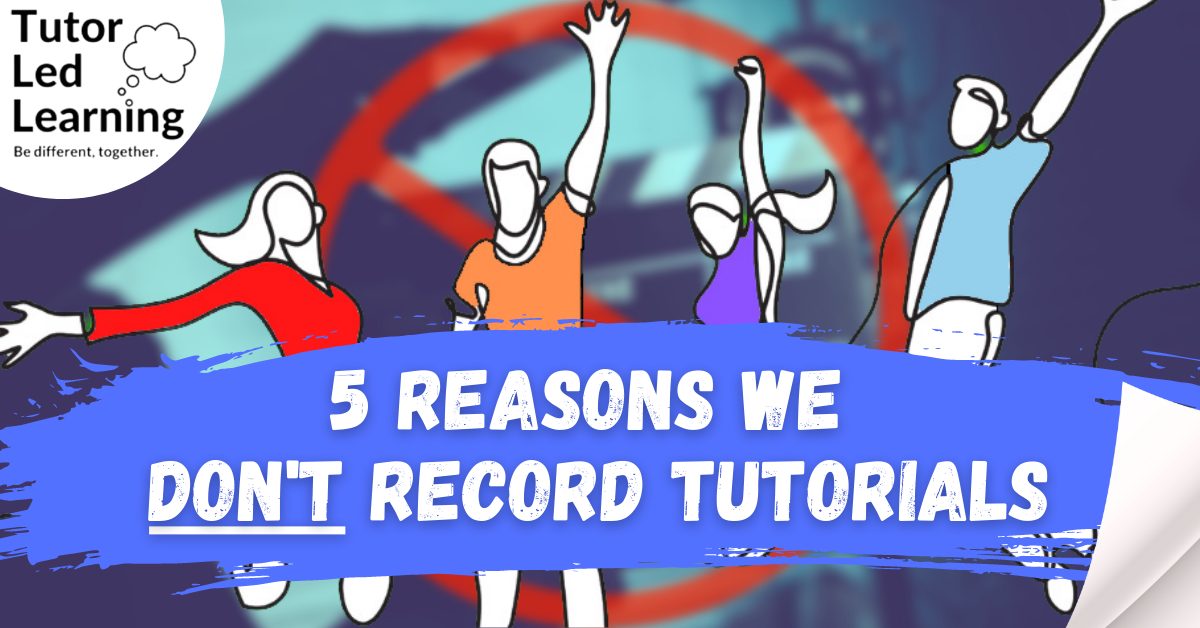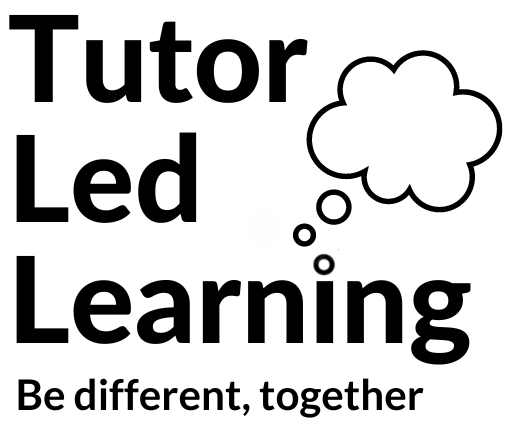
Looking for a different approach to education? Get in touch to see how we can support your Home Education journey.

As we encourage learners to have cameras on, one question we are frequently asked is whether or not we record our tutorials. Here are five reasons we have decided that recordings are not the best way to support our learners:
1. We want to encourage interaction (and create the freedom to make mistakes!)
Imagine for a moment that I ask you to do something you find challenging. Maybe it’s something mathematical. Perhaps it’s to do with spelling. Maybe it’s some form of skilled physical activity. You would rightly feel a bit uncomfortable. It’s ok though, because as a tutor I will reassure you, encourage you, give you praise and gently correct you as you learn. I’ll also let you know it’s alright to get things wrong. That is, after all, how we learn: through making mistakes and trying again. But for this to work, we need to feel we’re in an environment where we can safely make mistakes.
A sense of suddenly having to ‘perform’ arises and you become conscious that this moment, this moment where you are about to struggle to do something challenging, is about to become something permanent.
Tutor Dave
Now let’s imagine that I am going to record you as you attempt this difficult activity. As you attempt it, you become conscious of a red light blinking on my camera: recording has begun. A sense of suddenly having to ‘perform’ arises and you become conscious that this moment, this moment where you are about to struggle to do something challenging, is about to become something permanent. Your worry deepens when I tell you that this recording will be available for others to watch as many times as they want.
Would you prefer to just sit it out? Maybe just watch from the sidelines? It would be understandable if you did.
Young people are already highly sensitive to the opinions of their peers, so asking them to interact in tutorials is challenging to begin with. Recording our small group tutorials makes things more difficult for them. And this becomes even more problematic for those learners who experience anxiety.
2. To better support learners who are anxious or face other challenges
As former teachers, we know the pressures schools are facing to try to do their best for their students. We also know that it’s not always possible to meet their needs within the school system. Many learners come to us because they have not found the support they needed or because they have not have felt sufficiently challenged. Perhaps the way things are done in schools just isn’t quite right for them for one reason or another and we are happy to be able to support them in whichever way is best. But some learners come to us because they have anxiety. For these learners, the thought of being in a room full of their peers may feel genuinely frightening, and the thought of being put on the spot to answer questions is even worse. Because many of our learners have had this experience, we try to keep triggers for anxiety to a minimum. There are many ways we do this, which are woven in to our teaching practice, but keeping our groups small and not recording lessons is a big part of it. Both Tutors Andy and Dave have experience working in mental health (NHS, CAMHS, Delphis) and also in schools, so we understand that there is often a gap between the support that children need at school, and the support they actually get, despite the often heroic efforts of the teachers and other staff in schools. Tutor Led Learning exists to support our learners’ mental wellbeing as well as their education. In our opinion, these things go hand in hand.
3. To be responsive and flexible, and avoid giving ‘lectures’
Tutor Led Learning’s small group tutorials are not simply lectures, which could easily be recorded to be sold over and over again. Instead, our focus is on creating interactive moments. We encourage learners to share their ideas. We allow them to complete tasks and receive almost instant feedback. And we go with the natural flow of the needs of the learners.
The style to create recorded lessons has to be different. It has to be more like a lecture.
…responding to the shifting dynamics of a group of learners and their evolving knowledge (and mood) as tutorials progress is at the heart of good teaching.
Tutor Dave
It means responding less to students in the moment and sticking more to a script. This may work for some tutors, but responding to the shifting dynamics of a group of learners and their evolving knowledge (and mood) as tutorials progress is at the heart of good teaching. Ploughing on through lesson content because it is being recorded is no way to effectively support the learners who are in that group. In fact, the main goal is no longer about supporting individual students, but is about ensuring that you don’t ‘slip up’. You are being recorded, after all.
Therefore tutors might avoid engaging with learners in case they say the ‘wrong’ thing or ask difficult questions. At Tutor Led Learning we want learners to ask us challenging questions. We want them to think outside the box and test out new ideas. And we want to create an environment in our groups that allows this to happen. Recording tutorials would simply not promote this because we would have to fundamentally change our teaching style from one that is about individuals and their progress, to one which is more generic, less personalised and ultimately less beneficial for our learners.
4. To live in the moment and learn together
For some learners, knowing a recording will become available can be a reason not to engage with the lesson as it happens. Or perhaps not attend the lesson at all. If it will be available for them to watch later on, why bother to be in the lesson?
It matters because our learners are learning together.
Learners can be keen to share the knowledge they have and often the best thing a tutor can do is know when to step back and let the learners teach each other.
Tutor Dave
They get to discuss concepts and questions as they arise and bounce ideas off each other. They also learn the art of speaking in a group: knowing how and when to jump in with their ideas, learning how to disagree in a respectful way, and learning how to persuade others of their point of view. These are vitals skills we need throughout our lives and having an opportunity to practise them in tutorials is invaluable. It’s also a chance for young people to learn from each other. Learners can be keen to share the knowledge they have and often the best thing a tutor can do is know when to step back and let the learners teach each other. Often they express concepts in a way that the others just ‘get’ or they use examples that chime with the experiences of their peers.
A recording also doesn’t allow the tutor to help the learner there and then and one of the most powerful ways a tutor can help a learner is to give feedback in the moment.
5. To encourage social interaction and friendships
Simply watching back lessons that have been recorded may seem like it is the same as being involved, but it is not. In fact, for some learners, it can be quite the opposite. It may become isolating and create the sense of being an outside observer, rather than a participant.
Often, the friends we make in our childhood become the friends we have in our adult lives. When we are young many of these friendships happen because we are learning alongside others of a similar age. The shared experience of learning creates instant topics of conversation and amusing moments in tutorials become running jokes for years to come. Recording tutorials would stifle this interaction and require that the tutorial moves on relentlessly, not allowing for these important moments in our lives because it doesn’t add to the ‘learning’. We are proud to create time for these moments in our tutorials, have learners become friends in our tutorials and even travel across the country to meet up in real life!
So, there you have it, 5 reasons we have decided not to record our tutorials. If you are wondering how learners who miss our tutorials can catch up, then the answer is that we will help them! Many tutorials have content that can be accessed online and we are happy to email over work with explanations when needed. Many tutorials have worksheets available in Google Classroom that can be accessed at any time and, because we run tutorials rather than large webinar-style lectures, we can take the time to help students catch up and respond to the questions they have in our tutorials.
If you are interested in how we promote interaction in our small group tutorials, take a look at our article on why we encourage learners to have their cameras on.
If you would like to discuss any of these ideas further or find out how we can support your child, please just get in touch.
Tutor Dave (BA, MA, PGCE)
Be different, together.
